Why investors are flooding back into Indonesia
Indonesia has emerged from the economic crisis in better shape than it was before. Here, Cris Sholto Heaton puts the case for investing in the country.

Get the latest financial news, insights and expert analysis from our award-winning MoneyWeek team, to help you understand what really matters when it comes to your finances.
You are now subscribed
Your newsletter sign-up was successful
Want to add more newsletters?

Twice daily
MoneyWeek
Get the latest financial news, insights and expert analysis from our award-winning MoneyWeek team, to help you understand what really matters when it comes to your finances.

Four times a week
Look After My Bills
Sign up to our free money-saving newsletter, filled with the latest news and expert advice to help you find the best tips and deals for managing your bills. Start saving today!
There's been a lot of talk about how emerging markets are now safer than the developed world. And for the most part, this is just talk.
You can point as much as you like to stronger growth prospects and better balance sheets. It doesn't make much difference yet. When a crisis comes, foreign investors still flee back to the familiar. Look at the way that dollar soared during the panic over Europe and is now collapsing as fears recede.
But while emerging markets aren't the new safe havens, attitudes are shifting. There's been a reassessment of risk. And few places demonstrate this better than Indonesia
MoneyWeek
Subscribe to MoneyWeek today and get your first six magazine issues absolutely FREE

Sign up to Money Morning
Don't miss the latest investment and personal finances news, market analysis, plus money-saving tips with our free twice-daily newsletter
Don't miss the latest investment and personal finances news, market analysis, plus money-saving tips with our free twice-daily newsletter
A very strong recovery
Indonesia has come out of the crisis well. Last week's statistics showed that GDP growth in the second quarter had picked up to 6.2% year-on-year.
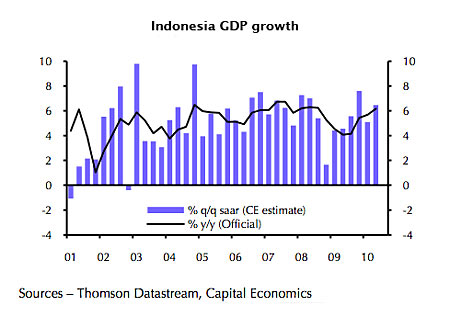
And this should be sustained even if much of the world is slowing. Consumer confidence remained solid. That's crucial since Indonesia's economy is heavily geared to domestic consumption.
Investment which is where the country lags behind much of Asia was up 8% year-on-year and rising bank credit should help support this. The loan to GDP ratio remains low at under 30%. There's enormous scope for this to rise financial services in Indonesia is one of Asia's best potential growth markets.
The only real cloud is inflation, up to 6.2% year-on-year in July. That partly reflects a recent rise in electricity tariffs. But strong demand and falling spare capacity mean that underlying pressures are building. The central bank will probably have to work hard to keep within its 4%-6% target range in the months ahead.
Investors are flooding back
But the economy is only part of the story. Financial markets tell us what investors think of Indonesia's prospects. And the verdict is positive. The Jakarta Composite Index is one of the few around the world to pass its pre-crisis peak.
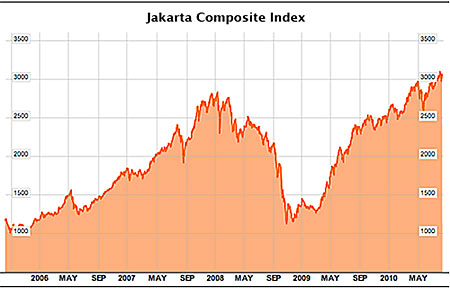
Meanwhile, foreign holdings of Indonesian government bonds are also at a new high (see chart). Indeed, enthusiastic foreign buying has pushed down yields to record lows across the curve. The two-year bond hit 6.5% and the ten-year fell to 8% in June.
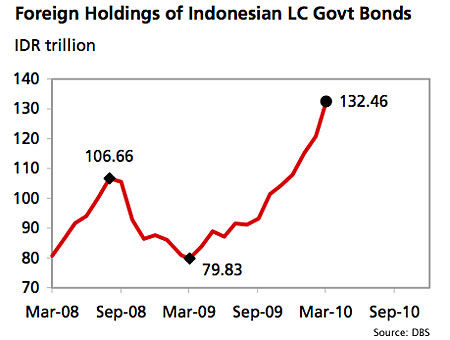
This is part of a trend that I've written about a few times in MoneyWeek Asia. Local currency bonds are almost certain to be an increasingly important market in years to come as investors regard the debt of countries such as Indonesia as less risky. Buying these will give you exposure to rising Asian currencies something you don't get by buying dollar-denominated debt issued by the same government.
Expert tips & advice for investing in Asia! Claim your FREE guides from MoneyWeek that include:
- How to go about investing to Asia
- Which brokers to use to buy foreign shares
Whether Indonesian bonds will continue to rise in the near future is another matter. The ratings agencies seem likely to upgrade it to investment grade over the next few years it's currently one level below at Fitch and two levels below at Moody's and S&P. As investors become more convinced of its creditworthiness, they'll accept lower yields as they need less compensation for the risk of default.
However inflation is picking up. The central bank will almost certainly raise interest rates by the end of the year and this will pose a headwind both for bonds and stocks. It's a question of whether foreign investors' desire to get exposure to the rising rupiah (see chart below) at an interest rate that's attractive by international standards will outweigh this.
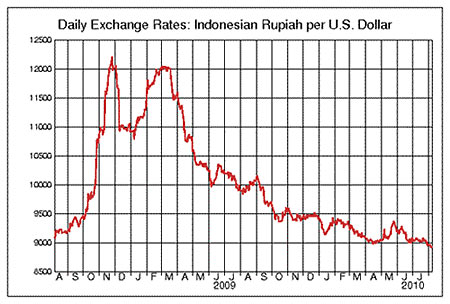
Corruption remains a major issue
Indonesia still has plenty of problems to deal with. As noted, investment has historically been weak; this manifests itself in poor infrastructure. An archipelago of five major islands (and 6,000 inhabited ones in total) is always going to present some major challenges.
That's part of the reason Indonesia scores poorly on 'ease of doing business' measures. Among major Asian economies, it ranks ahead only of India and the Philippines on the World Bank's index. Bureaucracy is another part of that, while the legal system could politely be described as unpredictable.
As usual, corruption plays a major part. This is probably the area where Indonesia needs the most improvement. Politicians are regularly implicated in events that if not actually corrupt are certainly far from ideal: the name of Aburizal Bakrie, former welfare minister and present chairman of the Golkar party, almost never appears in print these days except in conjunction with yet another alleged scandal linked to his family's Bakrie and Brothers conglomerate (the best-known part of which outside Indonesia is coalminer Bumi Resources).
President Susilo Bambang Yudhoyono and his reformist allies have always seemed credibly honest and capable. But Indonesian politics frequently degenerates into horse-trading one moment followed by an attempt to undermine rivals the next. Having been pushing harder against Bakrie and other vested interests a few months ago, Yudhoyono is now back in an uneasy alliance with them. These shifts can be extremely frustrating for outsiders.
On the plus side, corruption is increasingly in the headlines in Indonesia's relatively free and vocal press and increasingly unpopular with large sections of the electorate. An attempt by corrupt officials to frame two members of the Corruption Eradication Commission led to widespread street protests.
But overall, investors seem less worried by this than they were a few years ago, taking the view that Indonesia will continue to make slow progress in the right direction. I share this opinion but there are risks the biggest being that Yudhoyono's successor in 2014 does not share his reformist agenda.
The worst-case scenario might be a successful Bakrie bid for the presidency. Undoubtedly he would like to hold the most powerful office in the country and equally he would be an enormous step back for Indonesia. However, it's unclear that he has the personal popularity for such a run, especially against some of the popular, reformist, anti-corruption firms that Yudhoyono's allies could put forward.
The financial system still needs to grow
For now, perhaps the big problem for foreign investors in Indonesia is the effect that they have on the country's markets. The country needs to develop its financial system even more than most of its neighbours.
For example, stock market capitalisation is low, at 30%-40% of GDP. On the plus side, increasing amounts of foreign investment are encouraging more Indonesian firms to consider listing. Around 25 new listings are expected in the second half of the year, according to the FT. That's up from four in the first half and 13 in the whole of 2009.
But it's not just about the number of listed companies. Liquidity is light: for example, in the increasingly popular consumer goods sector. Only three stocks turn over more than $10m a day, which creates problems for funds. And with a weak home-grown investing culture, foreign flows seem to control the direction of the market.
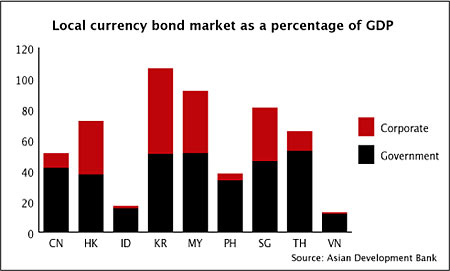
Of course, as is clear from the chart, this is a broader issue local currency corporate bond markets are small in most of Asia. That's why the development of these is potentially such an interesting theme in the years ahead.
Generally, deeper capital markets and growing wealth within Asia will make the idea that it can slip the Wall Street leash more realistic. At some point, the possibility of Asia offering safe havens won't be out of the question. And it may well happen more quickly than we expect. But for now, all we're looking for is small signs of progress such as those we're seeing in Indonesia.
This article is from MoneyWeek Asia, a FREE weekly email of investment ideas and news every Monday from MoneyWeek magazine, covering the world's fastest-developing and most exciting region. Sign up to MoneyWeek Asia here
Get the latest financial news, insights and expert analysis from our award-winning MoneyWeek team, to help you understand what really matters when it comes to your finances.

Cris Sholt Heaton is the contributing editor for MoneyWeek.
He is an investment analyst and writer who has been contributing to MoneyWeek since 2006 and was managing editor of the magazine between 2016 and 2018. He is experienced in covering international investing, believing many investors still focus too much on their home markets and that it pays to take advantage of all the opportunities the world offers.
He often writes about Asian equities, international income and global asset allocation.
-
 The downfall of Peter Mandelson
The downfall of Peter MandelsonPeter Mandelson is used to penning resignation statements, but his latest might well be his last. He might even face time in prison.
-
 Default pension funds: what’s in your workplace pension?
Default pension funds: what’s in your workplace pension?Default pension funds will often not be the best option for young savers or experienced investors